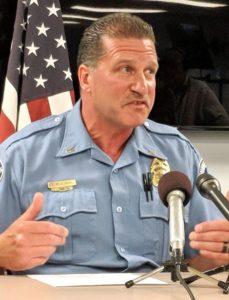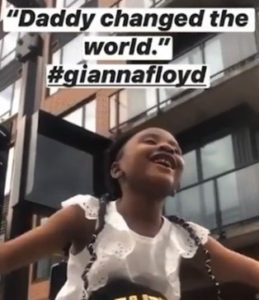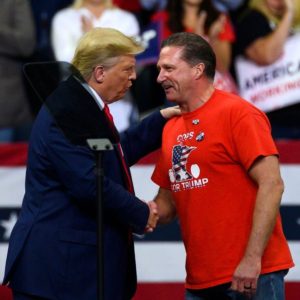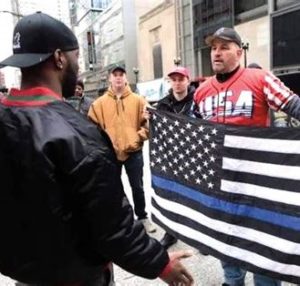“They condition their members to see themselves as soldiers at war with the public they are meant to serve, and above the laws they are meant to enforce.”
That’s the subheading of an article by Adam Serwer, an award-winning black journalist (bio here), published in The Atlantic on June 22, 2021 (read the article here).
Does he make the case? I think so.
Start with the murder of George Floyd (it’s now officially a murder, its perpetrator having been convicted of murder in a court of law).
 “Most Americans who watched the video of Floyd begging for his life, as Officer Derek Chauvin kneeled on his neck, saw a human being,” Serwer says, but Bob Kroll (photo, left), president of Minneapolis’ police union, saw Floyd as a “violent criminal” (he tried to pass a fake $20 bill, and didn’t fight the cops) and the largely peaceful protests against police brutality in response to his murder as a “terrorist movement.”
“Most Americans who watched the video of Floyd begging for his life, as Officer Derek Chauvin kneeled on his neck, saw a human being,” Serwer says, but Bob Kroll (photo, left), president of Minneapolis’ police union, saw Floyd as a “violent criminal” (he tried to pass a fake $20 bill, and didn’t fight the cops) and the largely peaceful protests against police brutality in response to his murder as a “terrorist movement.”
Serwer, the journalist, calls Kroll’s attitude “typical” of spokesmen for police unions. “In the apocalyptic rhetoric of police-union leaders, every victim of police misconduct is a criminal who had it coming, and anyone who objects to such misconduct is probably also a criminal,” he says, adding, “Due process is a privilege reserved for … police officers who might lose their jobs, not the citizens who might lose their lives in a chance encounter with law enforcement.”
That rhetoric didn’t work this time because it was “blunted by what Americans could see with their own eyes.” (The teenager who made the now-famous video of Floyd’s murder won a Pulitzer Prize, journalism’s highest honor. Bystander videos in general have become the DNA evidence of police misconduct and police lying in numerous other cases, too.)
But it isn’t just police unions; the agencies they work for are complicit in maintaining the so-called “blue wall of silence” against exposing police violence against citizens. On the day Floyd was killed, the Minneapolis P.D. issued a press release titled, “Man Dies After Medical Incident During Police Interaction” (read CNN’s story about that here).
 In the aftermath of George Floyd’s murder, saying “he changed the world” became the protesters’ rallying cry. Maybe he did, but maybe not. That depends on whether anything changes.
In the aftermath of George Floyd’s murder, saying “he changed the world” became the protesters’ rallying cry. Maybe he did, but maybe not. That depends on whether anything changes.
It did lead to the largest civil rights demonstrations — what Kroll cheekily calls a “terrorist movement” — in American history. Americans are, as Serwer says, “presently engaged in a debate about how to reform police.”
He argues reining in police unions has to be part of that, because “as long as they exist in anything like their current form, police unions will condition their members to see themselves as soldiers at war with the public they are meant to serve, and above the laws they are meant to enforce.”
That’s a stunning indictment, but one many police unions have earned by electing leaders like Kroll, fighting against disciplining even egregious misconduct, and looking the other way at racism in policing and their own ranks. They’ve also been stubborn defenders of the status quo and fierce opponents of even modest reforms.
Courts, all the way up to the Supreme Court, have found they’ve had to slap limits on police or they’d get out of control. “In a series of decisions,” Serwer writes, “the [Supreme] Court compelled cops to inform suspects of their rights, barred the use of evidence obtained through illegal search and seizure, and gave all defendants a right to counsel. These decisions curtailed, even if they did not eliminate, many of the lawless practices described by the Wickersham Commission. Cities began looking for ways to prevent police misconduct, such as civilian review boards.”
It wasn’t nearly enough. In fact, it spurred the formation of police unions, and stoked their aggression. In contract negotiations, “they sought not merely higher pay or better benefits, but protections for officers accused of misconduct.” And it didn’t prevent the rash of lawless police killings of black people now wracking America’s communities of color.
It’s very hard to overcome attitudes. “To many police officers, the reforms were simply pro-criminal,” Serwer says, which of course created an incentive to skirt or ignore them. This led, during the Obama years, to several large police departments (including Seattle’s) being put under federal court supervision on the grounds their use-of-force practices violated citizens’ civil rights. (Trump sought to terminate these interventions.)
Researchers have found that police unions using their political and bargaining leverage to protect bad cops led to increased police killings of citizens. (Today, U.S. police kill about 1,000 civilians a year, roughly 3 per day on average.) It also “cultivate[s] an unhealthy and secretive culture within police departments” that works to hide serious incidents of misconduct. Even worse, “This is a system that creates and protects bad apples by design,” Serwer says, in which “being a good cop can get you in trouble with your superiors, your fellow officers, and the union that represents you.” He then caustically adds, “Being a bad one can get you elected as a union rep.”
Serwer sees today’s police as “a risk to democracy.” He says police, egged on by their union leaders, “have a natural affinity for authoritarianism.” he also argues they play a leading role in America’s resurgence of racism: “And having leveraged a racist backlash to establish their grip on power, such unions will inevitably attract the support of those who see the preservation of racial hierarchy as paramount.”
 Police also have become politicized, and police unions are at the forefront of their politicization. “In the shared ideology of police unions and the Trumpist right, … safety is available only to those who refuse to criticize the police.” Police union bosses appeared with Trump at campaign rallies.
Police also have become politicized, and police unions are at the forefront of their politicization. “In the shared ideology of police unions and the Trumpist right, … safety is available only to those who refuse to criticize the police.” Police union bosses appeared with Trump at campaign rallies.
Cops, of course, are entitled to hold personal political views like the rest of us. But campaign appearances like Bob Kroll’s (photo, left) make the police look the agents and enforcers of a political party.
 Some police union leaders haven’t shied away from parading their lack of patriotism. In the wake of the January 6 insurrection at the Capitol, in which dozens of police officers were injured and one died, John Catanzara, head of Chicago’s police union (with defaced U.S. flag, photo right), “told a local news station how much he sympathized with an armed mob that attempted to overturn the results of a presidential election. ‘It was a bunch of pissed-off people that feel an election was stolen, somehow, some way,’ Catanzara said.” The election wasn’t stolen, and the “pissed-off people” — he refused to call them rioters or terrorists — were sore losers acting like children throwing a toddler tantrum. Catanzara isn’t defending law and order, or America’s values; he’s just a rabble-rouser.
Some police union leaders haven’t shied away from parading their lack of patriotism. In the wake of the January 6 insurrection at the Capitol, in which dozens of police officers were injured and one died, John Catanzara, head of Chicago’s police union (with defaced U.S. flag, photo right), “told a local news station how much he sympathized with an armed mob that attempted to overturn the results of a presidential election. ‘It was a bunch of pissed-off people that feel an election was stolen, somehow, some way,’ Catanzara said.” The election wasn’t stolen, and the “pissed-off people” — he refused to call them rioters or terrorists — were sore losers acting like children throwing a toddler tantrum. Catanzara isn’t defending law and order, or America’s values; he’s just a rabble-rouser.
“Forced to decide between defending democracy and maintaining the political alliances that protect their impunity, the unions made the obvious choice,” Serwer says. That “obvious choice” was to act in their self-interest instead of the public interest. But don’t most private organizations do that?
Serwer acknowledges that some people, including liberals, will argue “that workers—including police—have a fundamental right to organize.” But states can prohibit public employee unions, or severely limit their bargaining rights, and many states have done that. A majority of states have even curtailed private unions’ organizing and bargaining rights by enacting “right-to-work” laws.
Serwer seems to favor getting rid of police unions altogether. He says, “The question is why there should be police unions at all.” His rationale: “Because the defining work of police is violence, any police union is bound to eventually want to negotiate leniency for the misuse of violence by its members, and to advocate for policies that guarantee that leniency.” He also casts police unions as perpetrators and enforcers of systemic racism.
I don’t agree with the first characterization. While police are the designated agents of implementing state force, which sometimes is needed to protect society and its citizens, most police work is non-violent. Police do many things not involving use of force. Most cops never shoot anyone in their careers. It’s excessive or illegitimate use of force, and rogue cops like Derek Chauvin, that need to be brought under control. But Serwer is right that police unions are an obstacle to that.
He says, “The existence of powerful organizations that advocate for armed agents of the state at the expense of the public they serve is not simply an obstacle to reform. It is dangerous.” No reasonable person can disagree with that. The city leaders who appoint police chiefs must insist that the institutions of society, not police unions, control hiring, supervision, and discipline. Unions have a legal duty to represent their members, and a legitimate role to play in disciplinary actions against their members. But police unions must not be allowed to corrupt the disciplinary process or dictate its outcomes.
While Serwer’s article focuses on police unions, I see the problem as larger. How police are recruited, trained, and supervised needs fixing. Bad cops must be weeded out, the hiring process should keep people out of the profession who don’t belong there, and training and supervision should refocus on preventing the problems we’re experiencing with the policing of our communities. The answer is not defunding police, but better policing. (If someone wants to talk about police funding, then let’s point out that the legal settlements caused by bad cops could pay the salaries of a lot of good cops.)
Being a cop is a blue collar job. It’s one of the few “good jobs” left in America’s economy offering good pay and job security to people without formal education beyond high school. While this isn’t bad in itself, and not having advanced educational credentials doesn’t imply lack of intelligence or thinking skills, the erosion of other jobs open to those without college degrees attracts some people to police employment who aren’t suited for police work.
Discipline processes need reforming to weed them out. Hiring processes need reforming to keep them from getting in. Training and supervision need changes, if we’re to prevent the problems we’re seeing. There’s much work to do, and the task is more difficult because police personnel are scattered in more than 18,000 separate police entities in our country.
But we don’t need countless sets of police rules or best practices. One will do, and it’s relatively simple. Police officers must remember who they work for, and what their duty is: For us, to protect and serve. They are public servants, not public masters. We should only let them use force as a last resort, and sparingly. The militarization of police departments isn’t working to our benefit, and it’s time to steer police managers’ thinking and strategies in a different direction. And get politics out of our police institutions; the police must be politically neutral and race-blind in their official conduct.
There’s a long way to go, and I agree with Serwer that police unions as currently led are part of the problem, not part of the solution.
Police unions have to serve their members as any union does. Of course in this state the employer is the state so when officers are charged with crimes as well as potentially negative employment actions by the state, the police union is going to be right there. Even if an officer simply puts a dent in a police car or wrecks one their are going to be consequences. Of course the first thing the officer should do is contact their union representative. Just like any other union member would do. We don’t hear a lot about this side of what unions provide their members, it is there and a significant benefit. [This comment has been edited.]
Routine representation isn’t controversial. The rap against police unions is they have too much power and use it to keep bad cops on the street. The end result is abusive policing, especially against people of color. Serwer’s article reflects the profound distrust of police in minority communities, who often feel they’d be better off without any police. But the issue is larger than racist policing. The law enforcement system needs an overhaul, including more selective hiring, better training and supervision, and more accountability.